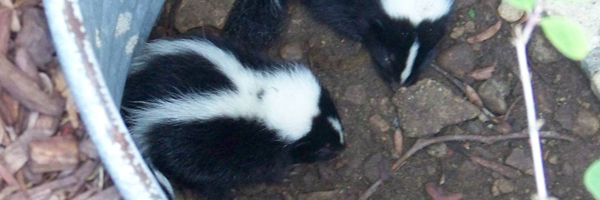- info@wildlife-removal.com
Call us for help in your town
Wildlife Removal Education
Are Skunks Good Pets?
Need skunk removal in your hometown? We service over 500 USA locations! Click here to hire us in your town and check prices - updated for year 2020.
Skunks require a great deal of work and except for the pen-raised, descented ones, it is generally not a good idea to make a wild skunk your pet. In some countries, it is even against the law to do so. The domestic skunks raised by wildlife rehabilitators usually make for good educational animals.

Wild skunks are highly destructive animals and cannot do without their defensive mechanism of spraying obnoxious liquid at perceived threats. They sure would make very stinky pets. It is an illegal practice in most areas, but you can have the scent-emitting glands removed from a skunk by veterinary doctors.
They are independent animals and will not respond to voice commands like dogs do. Neither will they take punishment from a human owner. And besides, skunks have a special diet composed of specific nutrients; they also have special training and health needs.
Yet another consideration is that skunks are nocturnal creatures, and that means they need to be fed at night while humans would need to be sleeping.
As they grow older, skunks would become more destructive around the house, or wherever they are kept, digging at furnishings and landscapes. They may also reveal a yucky love for garbage. Besides, the adults would need a lot of space to thrive.
If you must have a skunk pet, let it be the domesticated and descented ones that are considerably more tame and human-friendly than the wild ones. Endeavour to vaccinate your pet skunk regularly to protect them from sicknesses like rabies and canine distemper. Vaccination will also protect you and your kids or other pets from contracting any of these diseases.
And just like in the case of other animals kept as pets, you should pay regular visits to a veterinary doctor who will help you examine the pet to know if it is developing as it ought to.
Frequently cut the claws of your pet skunk to prevent it from inflicting injuries on kids or other pets, but do not remove these claws as they are needed to carry out some of their natural behaviours like digging, climbing etc.
Neutering and spaying are commonly done by the 4th month of the skunk’s birth. Neutering means removal of the male reproductive organs, while spaying is the removal of the ovaries in female animals.
Go back to the Skunk Removal page.


















